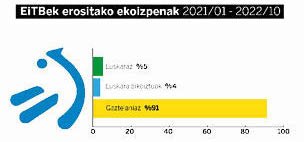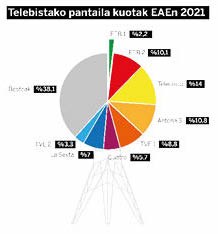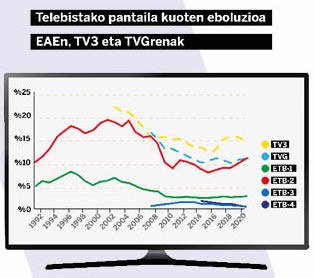
- The main audiovisual organization and tool created for the promotion and dissemination of the Basque Country has departed significantly from its objective. Remembering the foundational objectives of EiTB, reviewing its trajectory and taking into account current society and the audiovisual world can be a good time to rethink the organization itself and the whole offer.

If they decode the DNA of our petirrojo, I should say that it is “an indispensable instrument for the information, political participation and promotion and dissemination of the Basque Country and the Basque culture, together with the educational system”. At least the Act of 20 May 1982 establishing the Basque Radio Television Public Entity says so. “Basis for the development of rights and freedom” of Basque citizenship. Continuing with the aim of promoting Basque culture and Euskera, Article 3 makes direct reference to the total linguistic imbalance of the radio television offer in our country, to the detriment of the Basque country, and that programming in Euskera should serve to bridge this gap.
It has been 40 years since Euskadi Irratia held its first session on 23 November 1982 and since the lehendakari Garaikoetxea premiered ETB in the old years. Radio only 4 months and television only 3 years singing in Basque. In May 1983 Radio Euskadi started programming in full in Spanish and in 1986 ETB2. Since then, EiTB's robin has had only erdaldun mutations.
Proof of this distance is that, as Teletrash Euskaraz has just denounced, in the 1980s and 1990s 70% of the children of Araba, Bizkaia and Gipuzkoa saw ETB1 cartoons and currently ETB3 has a 0.3% screen share. For the generations that have grown up with ETB, Sandy Bell, King Arthur, Arale, Dotakon, Pottokas, Pac Man or the protagonists of the Dragoi Bola and Vegetables series spoke in Basque. However, today's children do it in Spanish, and if they also want it in English, like Youtube, Netflix, Amazon Prime, HBO, Movistar+, Disney+, Clan, Boing, Rakuten, Pluto, ATRESplayer, Appleego TV, Mothers, Mothers, Mothers, Mothers, Fathers Dragons, etc.
In fact, families who want to offer children Euskera content have some chance until they are 7 years old, at least if they avoid an overdose in Doraemon. But from there we have orphans to see in Basque the drawings and series they like the most. The friends of Goazen or Hasiberriak come from time to time to visit them, but only visit them. And forget, of course, about children's films, teenagers and young people in Basque.

The coordinator of Apantallamiento de Gipuzkoa, Ioritz González, complains about: “There are very few audiovisual content in Basque. It is surprising that there are fewer films folded than 20-30 years ago when we consumed a lot more. This is the case with cartoons. There are more chains, there is more consumption, there are more possibilities, but the supply in Basque has remained the same or has been reduced”. Izaskun Rekalde and Alex Aginagalde de Apantallamiento Euskaraz complain that in their day there are not dozens of films, series and cartoons folded for public money available to citizens.
According to data provided by members of the Gasteiz Parliament, 47% of Basques use streaming platforms and 75% of young people between 20 and 24 years old. But on these platforms there are hardly any movies in Basque. And in no case can you see series in Basque. In our cinemas the situation is also dramatic: only 1% of all performances are in Basque.
Without the risk of making mistakes, we can say that the audiovisual references of Basque youth are in Spanish.
But the problem is not just for young people. As I say, almost half of the citizens use audiovisual platforms and the presence of the Basque is null and void. But, on the other hand, although in recent decades it has been considerably reduced, especially among the youngest, in our homes we spend on average just over three hours on television. And there the situation is no better. In fact, the most visible television channels in Hego Euskal Herria are the Spanish channels produced outside Euskal Herria, which account for 87.7% of the CAPV's screen share. But among those produced in Euskal Herria, Spanish-language broadcasts, ETB2, account for 82.1% of the screen fee. In total, therefore, 97.8% of the television screen share of the Autonomous Community of the Basque Country corresponds to the programming in Spanish.
No one can be tempted to say that this has been a destiny of their own language. Because there are few Euskaldunes, because Euskera is not so developed to address some issues, because there is no habit of listening and speaking in Euskera on many issues... In short, a television or Basque programming cannot dream of competing in Spanish or having significant audiences. However, the cases of TV3 and TVG indicate otherwise. The two chains operating in Catalan and Galician compete in their territories against the other chains. TV3, notably, to the most viewed television in Catalonia, with a 14% screen share and TVG similarly, although more competitive. In addition, these two television stations which are programmed in a minority language have particularly good data in information and in prime time nights and weekends. It is very significant that a session such as the FAQs Interrogtes Freqüents of TV3, focused on political, economic, social and cultural actuality, has between 15% and 20% audience, 5-10 points more than the other Spanish programs that worked at the same time.

Address EiTB: kukua txantxangorri
So what about ETB? Why does Basque programming have so little public? Do Basques and Basques in general not want to watch television in Basque? Or perhaps it has to do with the quality of what is offered?
According to the director of the UPV/EHU Department of Audiovisual Communication and Advertising, Josu Amezaga, “ETB2 unbalances competition with ETB1. One channel has primacy over the other and there are things that are prioritized in favor of Spanish programming”. The UPV/EHU professor relates these imbalances with the development and decisions taken by ETB. In fact, ETB was born in Basque, but in 1986 ETB2 was created entirely in Spanish. It was then decided that ETB2 would mainly report and offer leisure programmes. Child programming and sport in ETB1. Through ETB1 sport, it entered almost every home and that is no small thing. But then more channels were created in Spanish, ETB lost the allowances of the league football matches. With digitalization, special child channels and a great deal of service were created. And ETB1 was greatly reduced in scope. ETB2, for its part, has continued to develop information and offer leisure programmes. As a result, the imbalance has been steadily increasing. Audience competition is higher than ever with the multiplication of channels and the offer of the last 10-15 years. Audience shares have decreased considerably. And in that competition, you've wagered on the Spanish-language channel, at least on a channel, to have a minimal audience. And the television in Euskera has been damaged.
EiTB addresses ETB1 in a similar way to txantxangorri. At birth, all puppies are eliminated.
Information is a clear example of this. The Basque people are offered at times when they are not used to watching television or the possibilities are limited and also much shorter. The Spanish ones, on the other hand, are shielded for longer and longer hours to sit in front of the TV. Last year, Spanish news had a 22.1% audience share, while Basque news had a 3.3% share.
As an example of this unequal competition, Amezaga puts what happened a couple of years ago, Sunday night, at 22:00, at the peak time. ETB2 in its 360 degree investigative journalism program offered Torture: the best hidden crime. At the same time, at ETB1, Herri Txiki, the Big Hell, had one of the best audiences in the chain in Euskera, with an average screen share of 4.2%, which at some point saw some 70,000 people. The torture programme aroused interest and the programme had the best audience data of its career (at some point 286,000 viewers and a screen fee of 11.5%). The sessions in Basque make up half of the regular audience. What happened? Well, if the audience of both channels is culturally, politically, sociologically very similar, it is to assume that the share lost by one won the other. That is, what ETB2 won was lost ETB1.
The same thing happened on Saturdays at night. While ETB2 has offered films released recently, ETB1 has offered dance and music performances recorded a year, two or three years ago. I recall that Commissioner TV3 Villarejo was interviewing the Commissioner on one of those Saturday nights with a bilbainada programme recorded by ETB1 on sewage, bribery and corruption in the Spanish State and the role played by the State apparatus in the procés.

In the last 7 years ETB1 has not doubled Euskera adult fiction, “there is no other case in the world, with its own language, that has not translated adult fiction into its language in the last 7 years”. The journalist of New Urtzi Urkizu, who is closely following EiTB, has also shown that since May 130 films have been broadcast in Spanish in ETB2, while ETB1 has not issued any. What is the problem with translating Basque series and fictional films punteras?
Let's not say El Conquis, the star program of ETB. Without entering the nature or relevance of the program, it has a screen fee close to 30%, and over 330,000 viewers see it at some point. But has anyone who runs ETB wondered how many vasco-speakers they see? For 56% of the viewers in El Conquis say they are vasco-speakers and 80% understand the Basque. Besides not offering an adequate television service to the Basques, is ETB not directing Basque viewers to the Spanish channel with the contents it offers? What could help to establish Euskaldunes in Spanish in their customs and Euskaldunization?
As Josu Amezaga says, Basques choose one channel or another, not by language, but by content. If the content is more attractive in Spanish, use Spanish. Various studies have explained that if, in a diglosic situation, the supply of languages is similar, minority language rapporteurs choose their language. However, ETB does not offer this option. The offer is totally unbalanced in favour of Spanish.
Without discussing if it is the most appropriate model, the structure and functioning of the radio is different. Although this also gives priority to Spanish production and offers more resources, each radio has its own structure, direction and programming policy. Although not in a balanced way, each channel functions as an autonomous agent in its attempt to attract its audience and tries to create the most appropriate programming for it. The supply of both channels is of quality, so the results are very different from those of television.
Euskadi Irratia offers an ordered offer, taking into account the number of listeners and audience data (7.9% audience and 150,000 listeners at some point of the day). The rest of the radios in Basque, Gaztea, although their language policy and treatment would give it to another report, has a good number of audiences and listeners (9.2% audience and about 170,000 listeners). Both have a number of listeners equivalent to the Ser radio in Spanish, hearings that are heard between them, and more than the strings that leave in Spanish from the EiTB group. Although the profiles and customs of those who listen to television and radio are very different, where are the people who listen to Basque radio daily more than 300,000 or, if preferred, to put it in front of more than 150,000 television stations that listen to Euskadi Irratia? I trust that the robin has given us in Spanish.
Taking into account the customs we have today to see and listen to the different contents, the numerous platforms and existing offers, the knowledge and linguistic customs of Basque citizenship and our need to euskaldunise citizenship, we are forced to radically rethink the policies, strategies and tools of our language, communication and audiovisual. The Basque authorities and the Basque public communication services play a key role in this, but legislation and policies that affect the private media will also be necessary.
In the meantime, in the different platforms of streaming www.zernonikusi.eus you will be able to enjoy the premieres in Basque and the premieres of films.